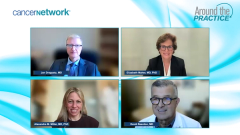
Case-Based Approach to Initial Treatment Planning for IDH-Mutant Gliomas
Panelists discuss how to counsel a 38-year-old patient with excellent surgical outcome about treatment options, weighing the benefits of early IDH inhibitor therapy against watchful waiting while considering individual patient factors and goals.
Episodes in this series

Content above is prompted by the following:
The first case presents an ideal scenario: a 38-year-old software engineer with an IDH-mutant, 1p/19q-codeleted oligodendroglioma who underwent gross total resection of a right frontal nonenhancing mass. This patient represents the "brass ring" of brain tumor diagnoses, combining favorable factors including young age, grade 2 histology, complete molecular characterization, and maximal surgical resection. Despite the excellent prognosis, experts emphasize that this remains an incurable cancer requiring long-term management and careful treatment sequencing decisions.
The case highlights the central dilemma in low-grade glioma management: whether to initiate IDH inhibitor therapy immediately or pursue watchful waiting. David Reardon, MD, advocates for early treatment consideration given the proven safety profile and therapeutic benefits of IDH inhibitors, while acknowledging the need for individualized decision-making based on patient goals and life circumstances. The discussion emphasizes that residual microscopic disease is inevitable even after gross total resection, making the question not whether to treat, but when to initiate therapy.
Expert oncologists describe spending several hours with newly diagnosed patients to thoroughly discuss all treatment options, prognosis, and life impact considerations. Patients typically fall into 2 camps: those who prefer to avoid immediate treatment and opt for surveillance, and those who want to start therapy immediately upon learning it's available. The panel emphasizes the importance of establishing realistic expectations about long-term disease management, ensuring patients understand the chronic nature of their condition, and setting up robust surveillance protocols regardless of the initial treatment decision.
Newsletter
Stay up to date on recent advances in the multidisciplinary approach to cancer.



































